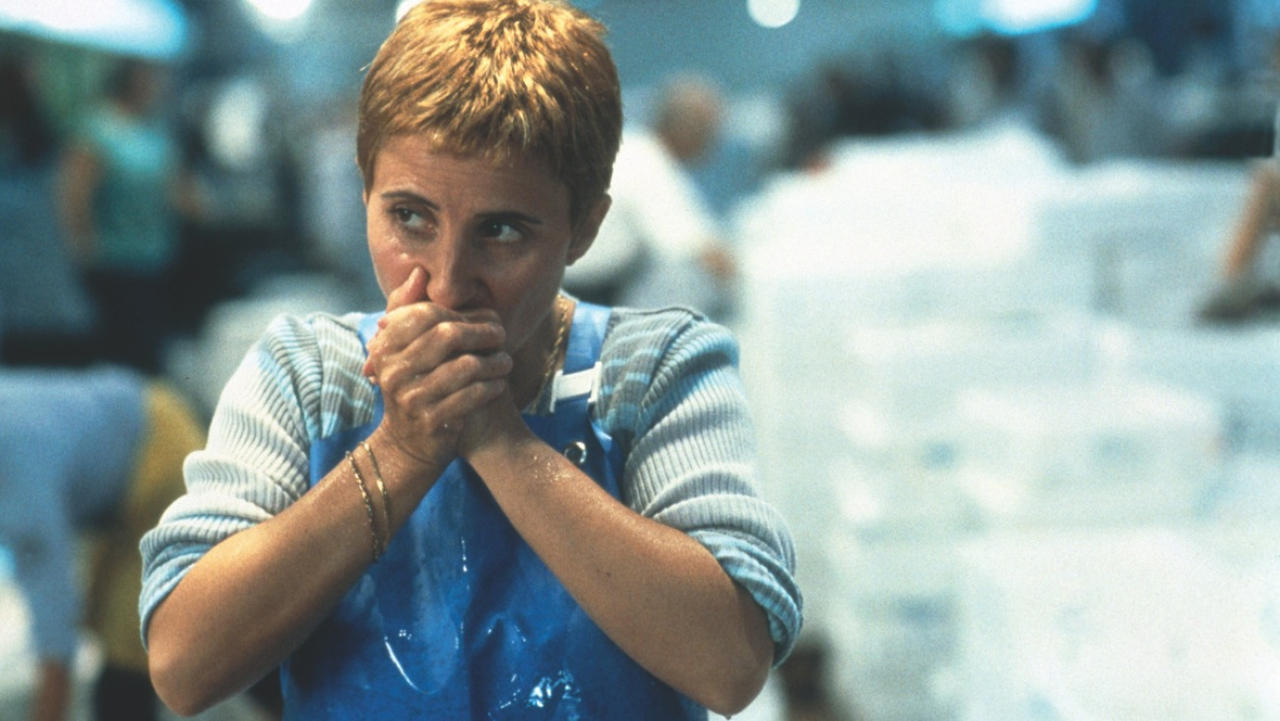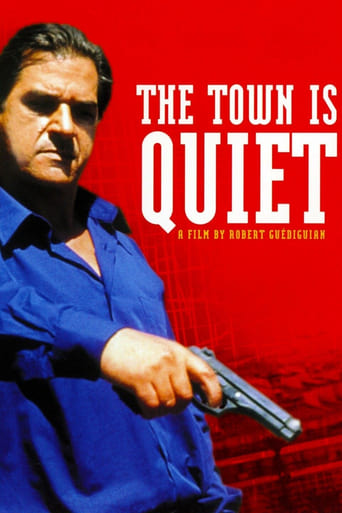Kattiera Nana
I think this is a new genre that they're all sort of working their way through it and haven't got all the kinks worked out yet but it's a genre that works for me.
Stevecorp
Don't listen to the negative reviews
PiraBit
if their story seems completely bonkers, almost like a feverish work of fiction, you ain't heard nothing yet.
Gurlyndrobb
While it doesn't offer any answers, it both thrills and makes you think.
Claudio Carvalho
In the contemporary Marseilles, Michèle (Ariane Ascaride) is a worker in the fishing market. She supports her family, composed by her unemployed husband, her addicted daughter Fiona (Julie-Marie Parmentier) and her granddaughter Ameline. Fiona prostitutes to buy drugs. Paul (Jean-Pierre Darroussin) is a stevedore, who betrays his colleagues and the union in a strike and buy a taxi with his indemnity. Gérard (Gérard Meylan) is a mysterious owner of a bar. Abderramane (Alexandre Ogou) is a black man who left jail and has an affair with a bourgeois. The lives of these characters are interconnected along the story. This movie is about ordinary people and touches in serious wounds in most of the worldwide societies, like unemployment, drugs, violence, crime, prostitution, prejudice against immigrants, loneliness, racism, low salaries, corrupts politicians. There is one particular scene that really touched me, when Michèle comments that only books have happy end. The title "The Town is Quiet" is very ironical and unfortunately the plot shows reality. I do not know if Robert Guédiquian wants to give some hope to the viewer, with that boy magnificently playing the piano he has finally bought in the end, but I found the story very bitter and pessimist. The direction and the performance of the cast are outstanding, and the soundtrack is excellent, highlighting Janis Joplin singing 'Summertime' and 'Cry Baby'. My vote is eight.Title (Brazil): 'A Cidade Está Tranquila' ("The Town is Quiet")
crashzoom
Idiosyncratic French filmmaker, Robert Guediguian, returns to his beloved hometown of Marseilles, for the gritty and ultimately heart-wrenching, La Ville est Tranquille (The Town is Quiet). This neo-realist lament details the often intertwined lives of numerous, diverse characters living within Marseilles' sun bleached confines. Much like Paul Thomas Anderson's Magnolia and the films of Robert Altman (Nashville, The Player), La Ville est Tranquille is built upon disparate vignettes and characters that ultimately converge, or in some cases collide with often devastating results.(Potential plot spoiler ahead)At its core is the harrowing story of a working class mother Michele (Ariane Ascaride), and her heroin-addicted daughter, Fiona (Julie-Marie Parmentier). Played with an earthy dignity by Ascaride (wife of director Guediguian), Michele, labours throughout the night at a fish market to support her daughter and infant grandchild. When the addiction grows more severe, Michele turns to prostitution to procure the drugs needed to ease her daughter's agony.This expression of love at its most extreme, brings Michele into contact with an old friend and lover from her youth, Gerard (Gerard Meylan), who now runs an always deserted bar that is a front for his dual careers as drug dealer and assassin. Soon, Michele's life is further complicated by a client Paul (Jean-Pierre Darroussin), a porn-addicted taxi driver who quickly falls for her. The relationships she shares with Paul and Gerard offer Michele the only degree of stability in her otherwise fractured existenceOther, intriguing stories intersect along the way before the films genuinely shocking denouement. Michele's ultimate solution to her predicament is in equal parts horrifying and heart-breaking.Finally, amid this bleak landscape filled with shattered lives, Guediguian offers us the faintest glimmer of hope. The dreams of an incidental character, a young immigrant pianist, are fulfilled to the suitable accompaniment of Bach's 'Jesu Joy of Man's Desiring'.Whilst La Ville est Tranquille is profoundly depressing, it does reward the viewer with a gripping exploration of the often heroic nature of love.
shark-43
I have JUST seen this film - literally an hour ago and was curious to come to IMDb and see what others thought because I really knew very little about this film before I went to see it. Basically it had an 8:30 pm showtime and that worked out better than other movies and their showtimes so there I was. I felt the film really had trouble finding it's footing in the first twenty minutes. The director was obviously building blocks and setting things up but I was pretty uninvolved, but then, once all these characters' lives start to intersect and the stories start to build, the film just grips you and won't let go. Not in any thriller kind of way, but in a very believable, yet depressing, but human, real life way. The director trusts his story and actors so much (the acting is top notch) that he just lets the camera stay still and show you what happens. Now, if this film was just bleak and nothing else, well, then I probably would have hated it, but there are real moments of true, selfless love and even at the end, signs of hope and beauty that makes the movie special. I could see how many people might dislike the film and even walk out in the beginning, but Overall, the film packs a punch, a wild emotional punch, but like many great dramas, it leaves you thinking a great deal about life and society and mankind (good and bad).
Philby-3
This is a production not so much of the French film industry as the Marseille `film co-operative' headed by Robert Guédiguian (`Marius et Jeanette', `A la place du cour'). The same group have been making low-budget films on the theme of working class life for 20 years, and on the evidence of this one they are just getting better. What distinguishes their films is not so much the left –wing viewpoint mixed with obscure French philosophy (sorry M. Foucault) both of which are present, but an interesting combination of super-realist, almost documentary presentation and a decidedly melodramatic storyline.In this film Ariane Ascaride plays a woman in her late thirties, old before her time, who is the sole support of her family (hubby has been out of work for three years). She toils by night in the fish markets, but this is not enough. Her 16 year old daughter, Fiona (Julie-Marie Parmentier) has already both a baby and a serious heroin addiction. After finding her daughter doing oral sex for money in the living room of their tiny flat, Michèle goes on the game herself, with no great success, although she does enlist the rather dopey Paul (Jean-Pierre Darroussin), a docker turned taxi-diver, as a regular customer. She turns to an old acquaintance, Gérard (Gérard Meylan), to supply her with heroin for Fiona. Meanwhile, Viviane (Christine Brucher), a drama teacher from a more refined neighbourhood, becomes involved with Abderramane, (Alexandre Ogou) a young black ex-con she had met while teaching a group of prisioners. Needless to say, things do not go smoothly. The storylines are topped and tailed by the quest of a Armenian immigrant boy for a decent piano to match his precocious talent.The film is beautifully crafted; the various stories are brought together in a powerful and shocking conclusion. The scenes between mother and daughter are painful to watch, but justifiably so. Their situation is really not much to do with politics and Foucault, after all drugs plague the middle class as well, but Michèle has only her daughter. Pitched against the personal tragedy there is the plight of the workers as a whole; cast out of employment by mechanisation on the docks they are driven into the arms of the neo-fascists, to whom, of course, they are mere cannon–fodder. But the political viewpoint of the film is suggestive rather than strident, more a background to the personal dramas than the main theme, which what happens to personal relationships when put under unbearable pressure.Despite the drama and tragedy, there is some subtle humour in the film. Where a flashback sequence is required at one point the director uses a clip from a movie made by him 20 years ago which happens to feature the same actors. There is the bumbling but kind-hearted cabbie, his retired left-wing parents and Michèle's husband to provide some amusement also. The look and feel of Marseille is conveyed beautifully; this reviewer last visited the place 25 years ago and got the distinct feeling that the tatty but colourful town of those days is now distinctly uglier and a great deal more dangerous. Guédiguian, however, has not given up on the place and he and his troupe continue to tell compelling stories of Marseille life.

